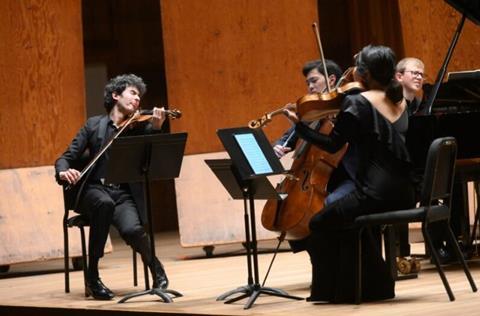Bruce Hodges hears the performance of Brahms, Vaughan Williams and Florence Price at the American Philosophical Society, Philadelphia, PA, US, on 6 December 2023

For the second of this Musicians from Marlboro series (the first was reviewed last month), the Philadelphia Chamber Music Society presented six more artists with ties to the venerable Vermont festival.
The pearl of the evening turned out to be Brahms’s Second Piano Quartet op.26, with Itamar Zorman (violin), Haesue Lee (viola), Brannon Cho (cello) and Filippo Gorini (piano). In the stormy first movement, Zorman set the pace, with his three collaborators showing the kind of teamwork that makes great chamber music the most satisfying intellectual and emotional journey. The second movement basked in a keen attention to phrasing – gentle swells rather than the opening movement’s climaxes – giving it an epic feel.
In the third-movement Scherzo, more passion rained down, with broad bow strokes countered with Gorini’s forceful keyboard accents, and the final chord was delivered with impressive resonance which seemed to hang in the air of the venerable hall. The foursome reserved maximum drama for the final movement, which was electrically charged with vigour. Punchy rhythms alternated with sweeping phrases and some carefully judged lulls in the storminess. But, after briefly subsiding, it only resumed with apocalyptic fervour.
Concert review: Musicians from Marlboro
Read: Sugar vs caramel: comparing the sound of the ‘Joachim-Ma’ Stradivarius to that of other violins
Listen: The Strad Podcast Episode #50: Itamar Zorman on violin globetrotting
Opening the programme were Vaughan Williams’s Ten Blake Songs (1957), passionately done by tenor Patrick Bessenbacher and oboist Mary Lynch VanderKolk. She and pianist Gorini followed with three songs by Florence Price (arranged by the oboist) with the duo vying with each other for poignancy honours. A phrase from the first Blake song could apply to the entire concert: ‘Sweet joy befall thee’. In these times, we could all use a bit more sweet joy like this.
BRUCE HODGES











































No comments yet